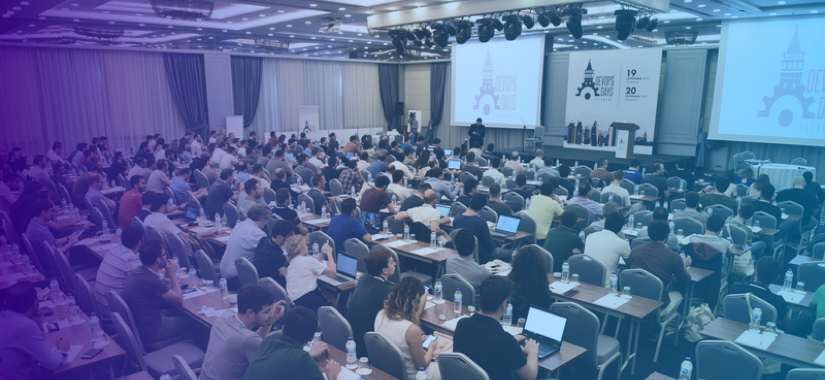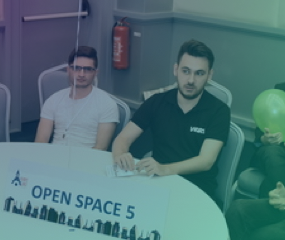Welcome to the DevOpsDays Online Turkey 2021!
DevOpsDays is a technical conference, aimed at developers, sysadmins and anyone else involved in technology, whether expert or beginner. The person behind the idea of DevOps is Patrick Debois, who came up with this method of improving the code and cooperation. The term "DevOps" was popularized thanks to a series of "DevOpsDays" conferences. The first edition of this Conference was held in Belgium in 2009. Since then, DevOpsDays conferences have spread across the globe. All conferences run on a similar formula and are divided into three elements:
Presentations
Presentations are 25 min. long talks on a specific topic related to DevOps. Learn from great practitioners and leaders in our industry.
Panel discussions
Panel discussions bring experts together to talk about that one interesting topic you’ve been waiting to learn and deep dive. These sessions are in Turkish.

Conversations
Discord helps us continue discussions after talks and panel discussions. Keep in contact with your fellow devops friends in our community channel.
Listen to the Event Speakers

Andrew Clay Shafer
VP Transformation @RedHatKeynote: The Conflict of DevOps

Patrick Debois
Advisor @Snyk, DevOpsDays FounderPanel Discussion

Kris Buytaert
Co-founder and CTO @ InuitsPanel Discussion

Çağdaş Şenol
Principal Software Engineer at Zalando SEYazılımda Mukavemet Desenleri
Yazılımda desen konusu, tasarım desenleri sayesinde tanınırlık ve saygınlık kazanmış durumda. Tasarım desenleri yazılımcılara düzgün kod sağlasa da , operasyonel dertlerden bizleri kurtaracak çözümleri sunmamaktadır. Bulut tabanli ve servis odakli yazılımların gitgide artmasi sayesinde, yazılımcıların düzgün kod kadar, patlamayan sistemlere de ihtiyaci artmaktadir. Bu konuşmada sizlere yaşanmış örneklerle, mukavemet desenlerinin sistemlerinizi nasil daha az kırılgan yapacağını anlatacağım. Gece yarısı çağrı cihazlarınızın daha az ötmesini istiyorsaniz, faydalı bilgiler bu konuşmada sizleri beklemekte.

Rosemary Wang
Developer Advocate @HashiCorpSecrets Management for Development and Operations
Your company tells you they want to secure your application and infrastructure with a secrets manager. How should you use it, and how will it affect your code? In this session, you’ll learn how to refactor your applications, delivery pipelines, local development, and infrastructure to accommodate rotating secrets. You'll take away the best practices and patterns for integrating with a secrets manager while minimizing interruptions to your development workflow.

Jason Yee
Director of Advocacy @GremlinThe Adjacent Possible: Evolution, Innovation & Catastrophe
We often talk about failure as complex and therefore unpredictable. But what if we’re wrong and major incidents are not only predictable, but inevitable? I’ll discuss the Adjacent Possible and how to untangle complexity to prevent catastrophes.

Nicolas Fränkel
Developer Advocate @HazelcastYour own Kubernetes Operator: Not Only in Go
In Kubernetes, operators allow the API to be extended to your heart content. If one task requires too much YAML, it’s easy to create an operator to take care of the repetitive cruft, and only require a minimum amount of YAML. On the other hand, since its beginnings, the Go language has been advertised as closer to the hardware, and is now ubiquitous in low-level programming. Kubernetes has been rewritten from Java to Go, and its whole ecosystem revolves around Go. For that reason, It’s only natural that Kubernetes provides a Go-based framework to create your own operator. While it makes sense, it requires organizations willing to go down this road to have Go developers, and/or train their teams in Go. While perfectly acceptable, this is not the only option. In fact, since Kubernetes is based on REST, why settle for Go and not use your own favorite language? In this talk, I’ll describe what an operator is, how they work, how to design one, and finally demo an operator that is as good as a Go one.

Josh Armitage
Principal Consultant @ContinoLean Product Development Through SLOs
How can you strip over-processing out of your value stream? A story of how, as a team, we adopted SRE and SLOs, using them as a key part of our product development flow, which allowed us to maximise the creation of value. Learn how to combine Lean Thinking, SRE and Product Development together.

Laura Santamaria
Developer Advocate @PulumiEngineering the Cloud: Exploring infrastructure as code in real life
Ever wonder how you can improve your infrastructure processes like a developer can improve building software? In short, you've been thinking about infrastructure-as-code (IaC) and cloud engineering. In this talk and demo, we'll build, deploy, and manage a simple, life-like stack with cloud engineering principles. While we're working, we discuss the pros and cons of IaC and cloud engineering, the differences among various providers and DIY setups, and the future of cloud engineering. Let's get into the terminal and see what we can build together.


Schedule Details Event Schedules
Opening and Format
Closing

... Past Events










